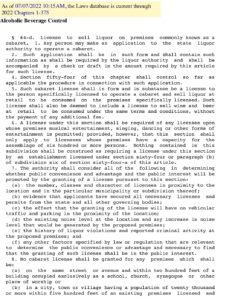The SLA is subject to New York's Alcohol and Beverage Control Law. Although the SLA can regulate "Cabarets" but only if the capacity exceeds 600. There is nothing it the ABC which authorizes the questions included in the questionnaires to applicants for Licenses or Changes in Method of Operation.
The Alcohol Beverage Control law may be found at Justia.
Relevant provisions relating to on-premises licenses is NY Alcoh Bev Ctrl L § 64 (2022) License to Sell Liquor at Retail for Consumption on the Premises.
The SLA is only allowed to inquire as to additional categories of information needed to carry out its functions. Section 110.7 allows questions as to topless or exotic dancing, but no specific authority is granted to the SLA to inquire as to patron dancing, type of music, or live music. The SLA forms state:
This form satisfies Section 110 of the ABC Law requiring that a statement be submitted indicating the type of establishment operated at the premises.
§ 64-d. License to sell liquor on premises commonly known as a cabaret.
1. Any person may make an application to the state liquor authority to operate a cabaret.
* * *
A license under this section shall be required of any licensee upon whose premises musical entertainment, singing, dancing or other forms of entertainment is permitted; provided, however, that this section shall only apply to licensees whose premises have a capacity for the assemblage of six hundred or more persons. Nothing contained in this subdivision shall be construed as requiring a license under this section by an establishment licensed under section sixty-four or paragraph (b) of subdivision six of section sixty-four-a of this article.
§ 110. Information to be requested in applications for licenses or permits.
1. The following shall be the information required on an application for a license or permit:
* * *
(f) A statement indicating the type of establishment to be operated at the premises. Such statement shall indicate the occurrence of topless entertainment and/or exotic dancing whether topless or otherwise, including, but not limited to, pole dancing and lap dancing, at the establishment.
7. The authority may, by rule, adopt additional categories of information which may be reasonably necessary to carry out the provisions of this section.
Notification to Community Boards
§ 110-b.
(b) in the city of New York, the community board established pursuant to section twenty-eight hundred of the New York city charter with jurisdiction over the area in which the premises is located shall be considered the appropriate public body to which notification shall be given.
Five Hundred Foot Law – Not Applicable to Music and Dance, but often misunderstood:
§ 64 (f) of the Alcoholic Beverage Control Law:
f) Notwithstanding the provisions of paragraph (b) of this subdivision, the authority may issue a license pursuant to this section for a premises which shall be within five hundred feet of three or more existing premises licensed and operating pursuant to this section and sections sixty-four-a, sixty-four-b, sixty-four-c, and/or sixty-four-d of this article if, after consultation with the municipality or community board, it determines that granting such license would be in the public interest. Before it may issue any such license, the authority shall conduct a hearing, upon notice to the applicant and the municipality or community board, and shall state and file in its office
its reasons therefor. The hearing may be rescheduled, adjourned or continued, and the authority shall give notice to the applicant and the municipality or community board of any such rescheduled, adjourned or continued hearing. Before the authority issues any said license, the authority or one or more of the commissioners thereof may, in addition to the hearing required by this paragraph, also conduct a public meeting regarding said license, upon notice to the applicant and the municipality or community board. The public meeting may be rescheduled, adjourned or continued, and the authority shall give notice to the applicant and the municipality or community board of any such rescheduled, adjourned or continued public meeting. Notice to the municipality or community board shall mean written notice mailed by the authority to such municipality or community board at least fifteen days in advance of any hearing scheduled pursuant to this paragraph. Upon the request of the authority, any municipality or community board may waive the fifteen day notice requirement. No premises having been granted a license pursuant to this section shall be denied a renewal of such license upon the grounds that such premises are within five hundred feet of a building or buildings wherein three or more premises are licensed and operating pursuant to this section and sections sixty-four-a, sixty-four-b, sixty-four-c, and/or sixty-four-d of this article.
§ 64[6-a]
6-a. The authority may consider any or all of the following in determining whether public convenience and advantage and the public interest will be promoted by the granting of licenses and permits for the sale of alcoholic beverages at a particular unlicensed location:
(a) The number, classes and character of licenses in proximity to the location and in the particular municipality or subdivision thereof.
(b) Evidence that all necessary licenses and permits have been obtained from the state and all other governing bodies.
(c) Effect of the grant of the license on vehicular traffic and parking in proximity to the location.
(d) The existing noise level at the location and any increase in noise level that would be generated by the proposed premises.
(e) The history of liquor violations and reported criminal activity at the proposed premises.
(f) Any other factors specified by law or regulation that are relevant to determine the public convenience and advantage and public interest of the community.
